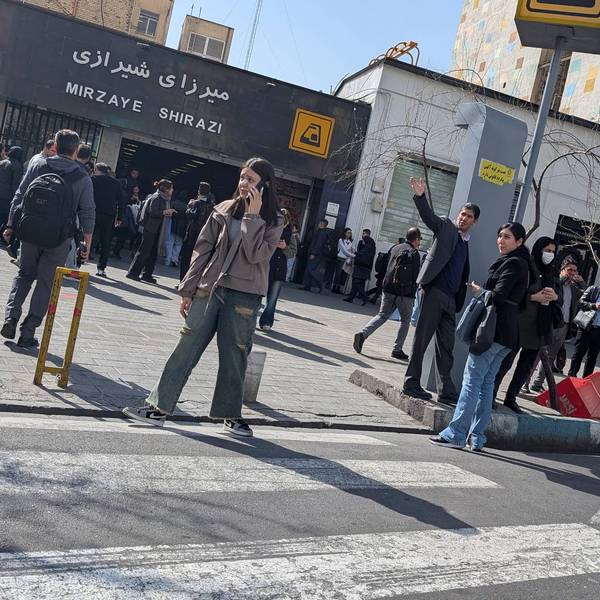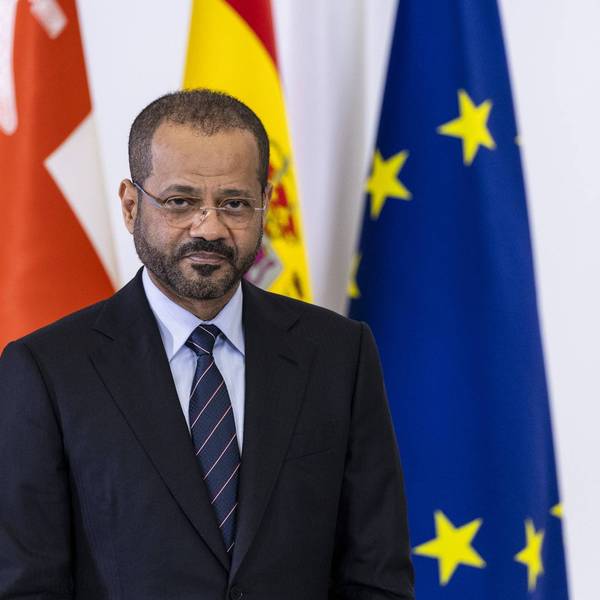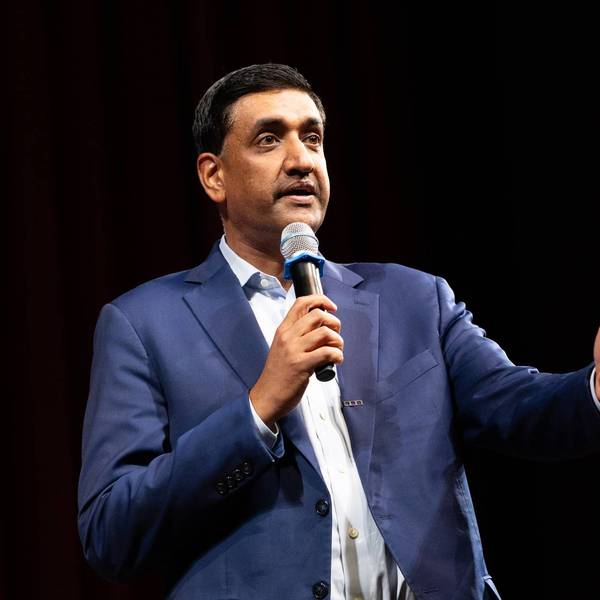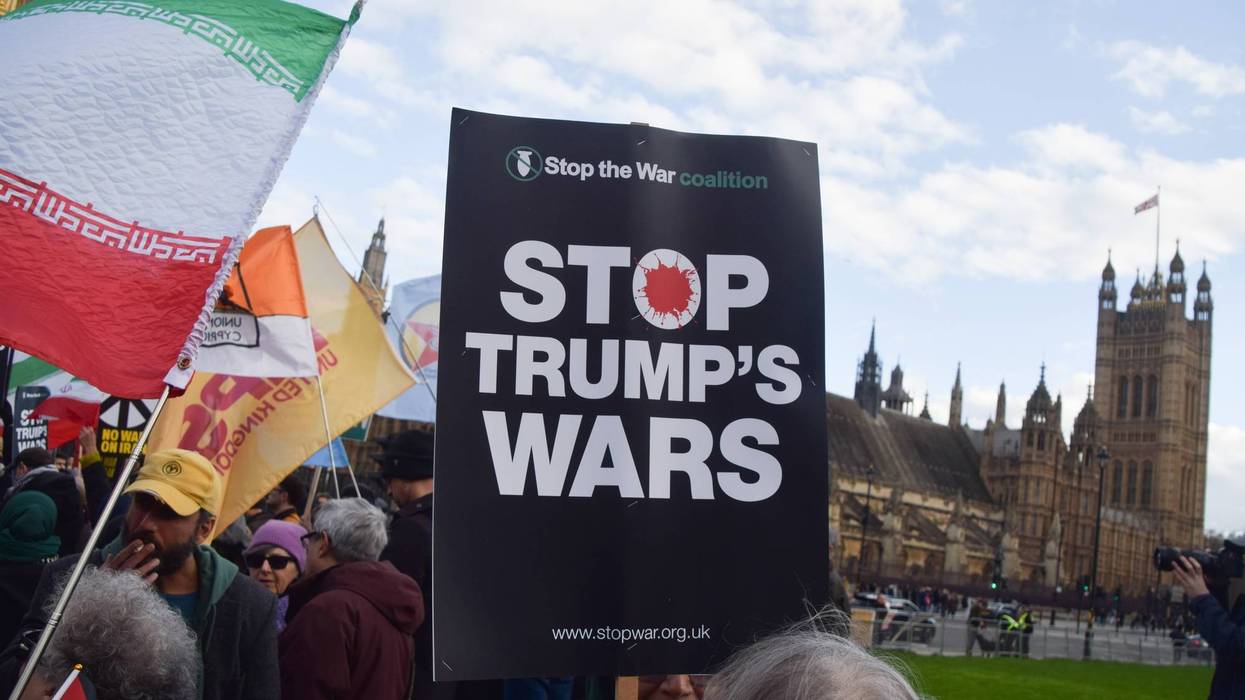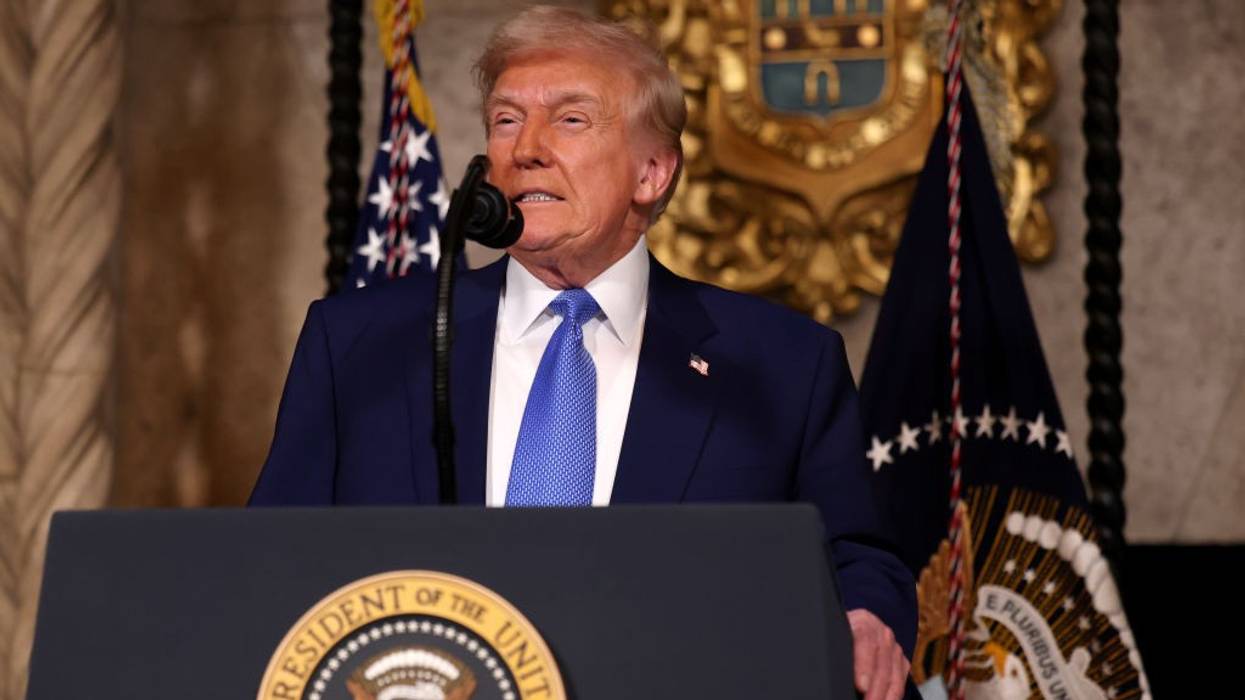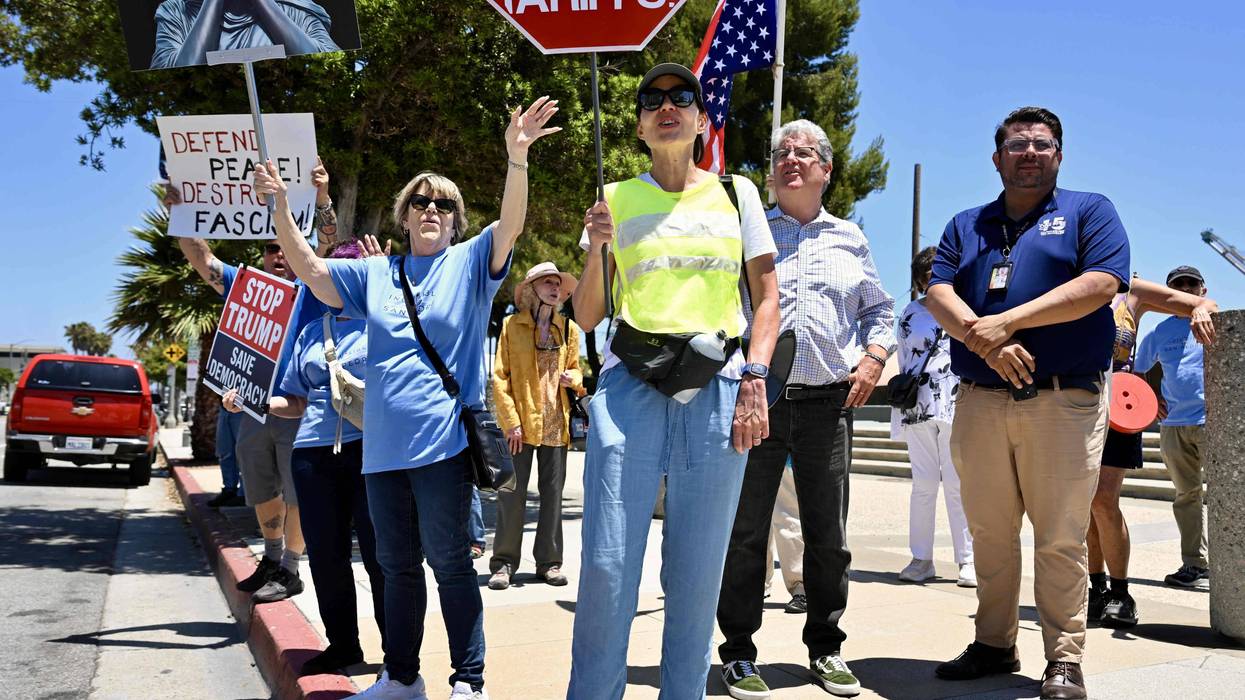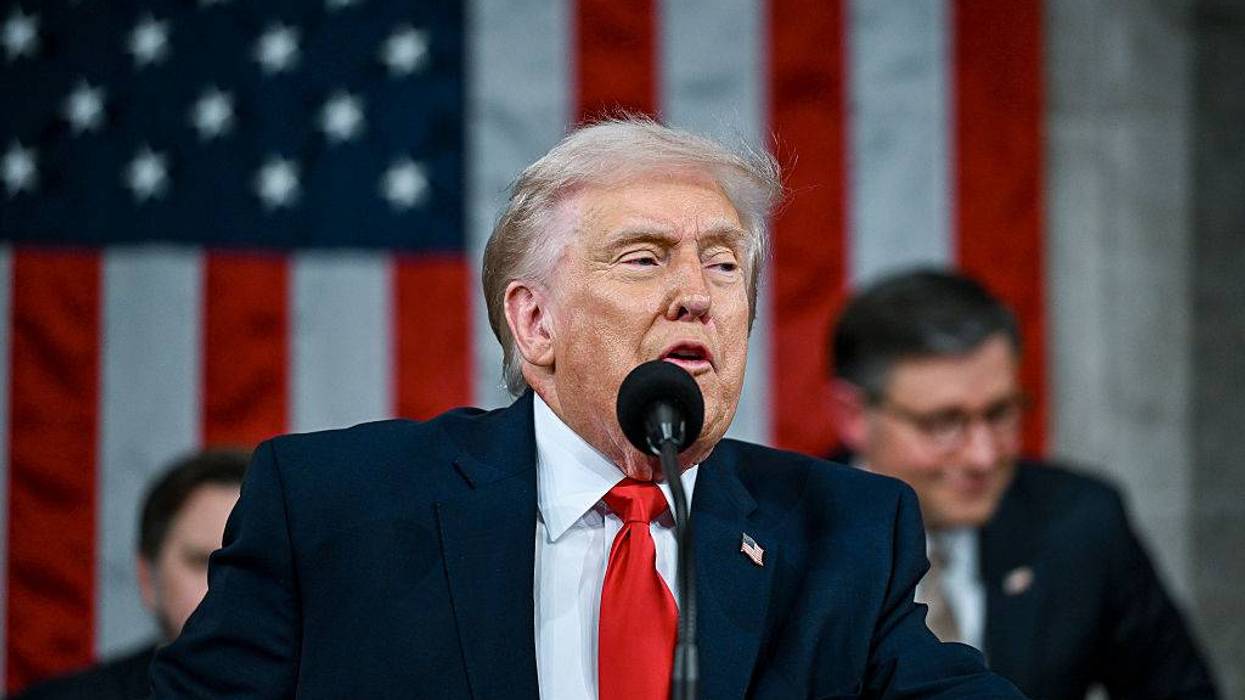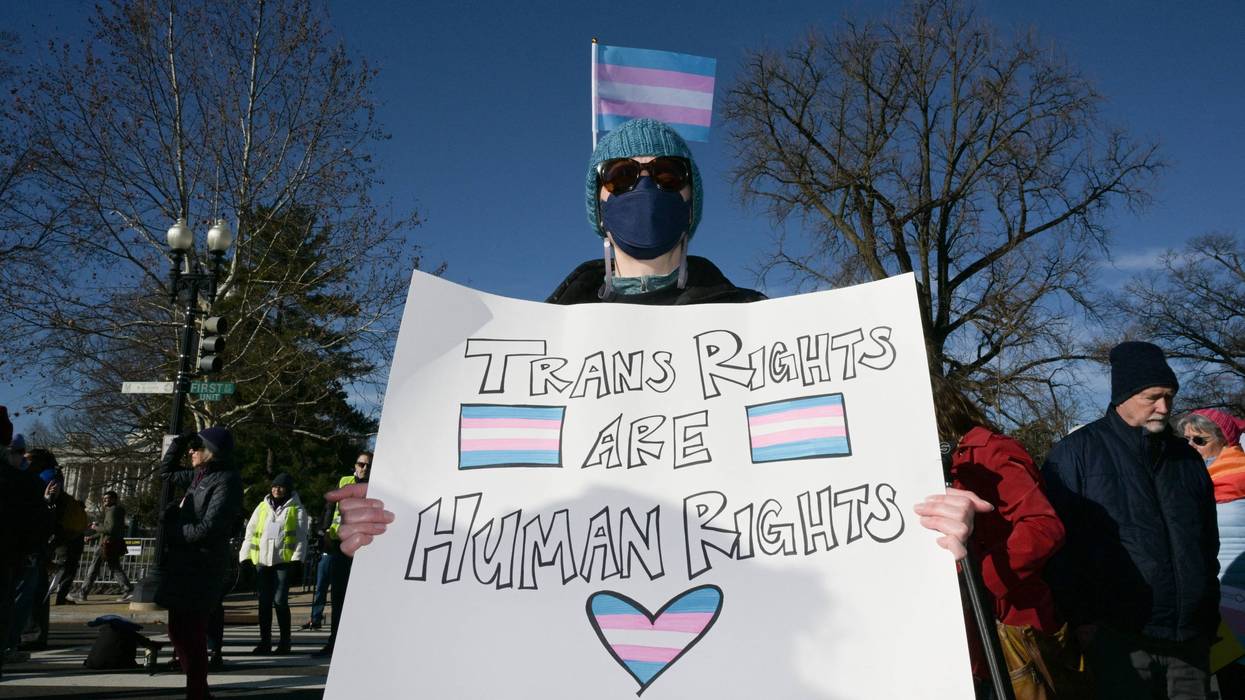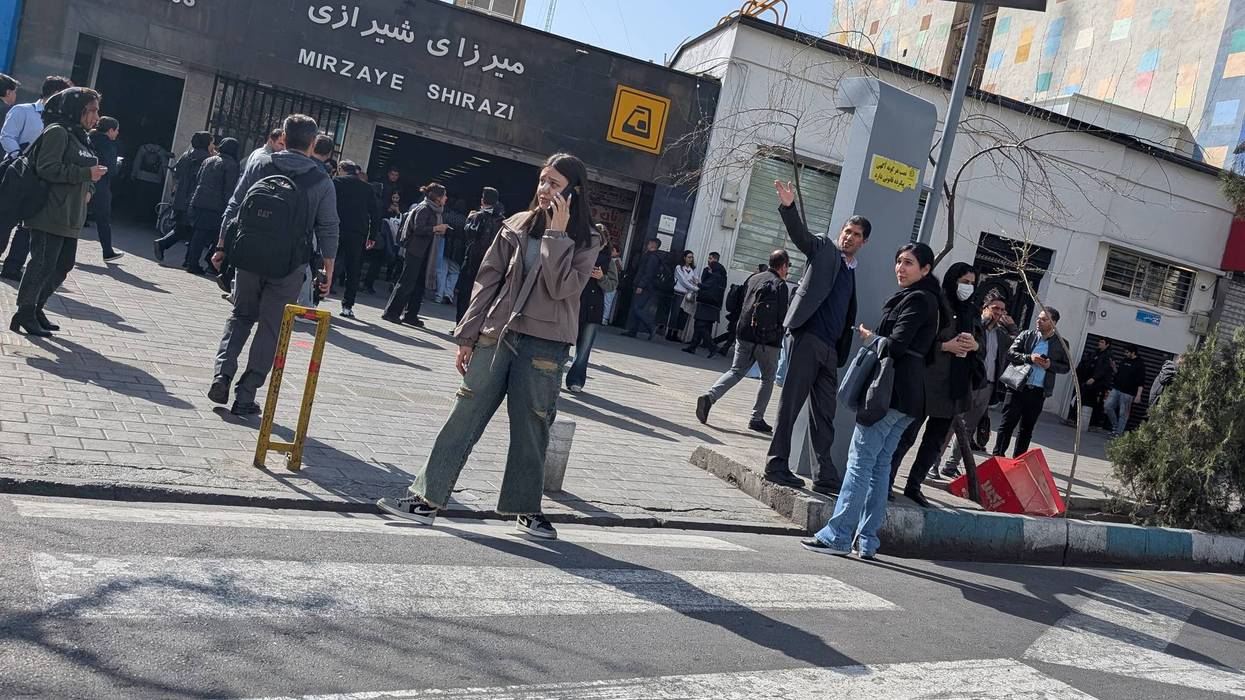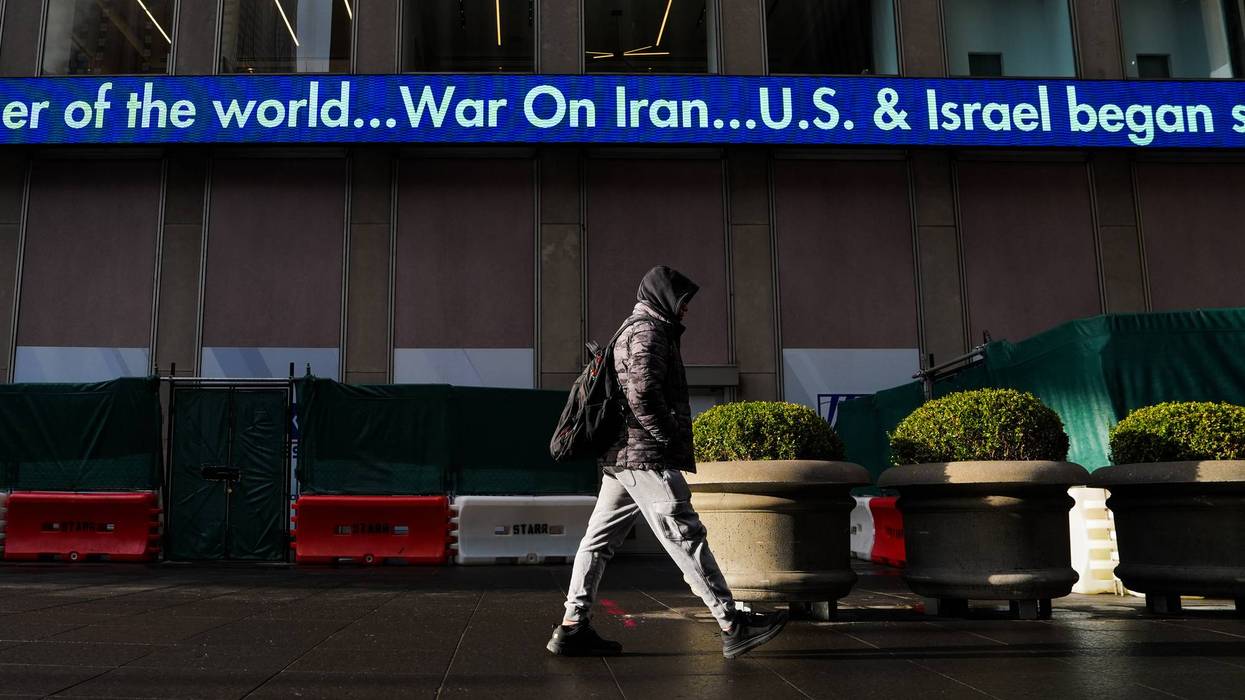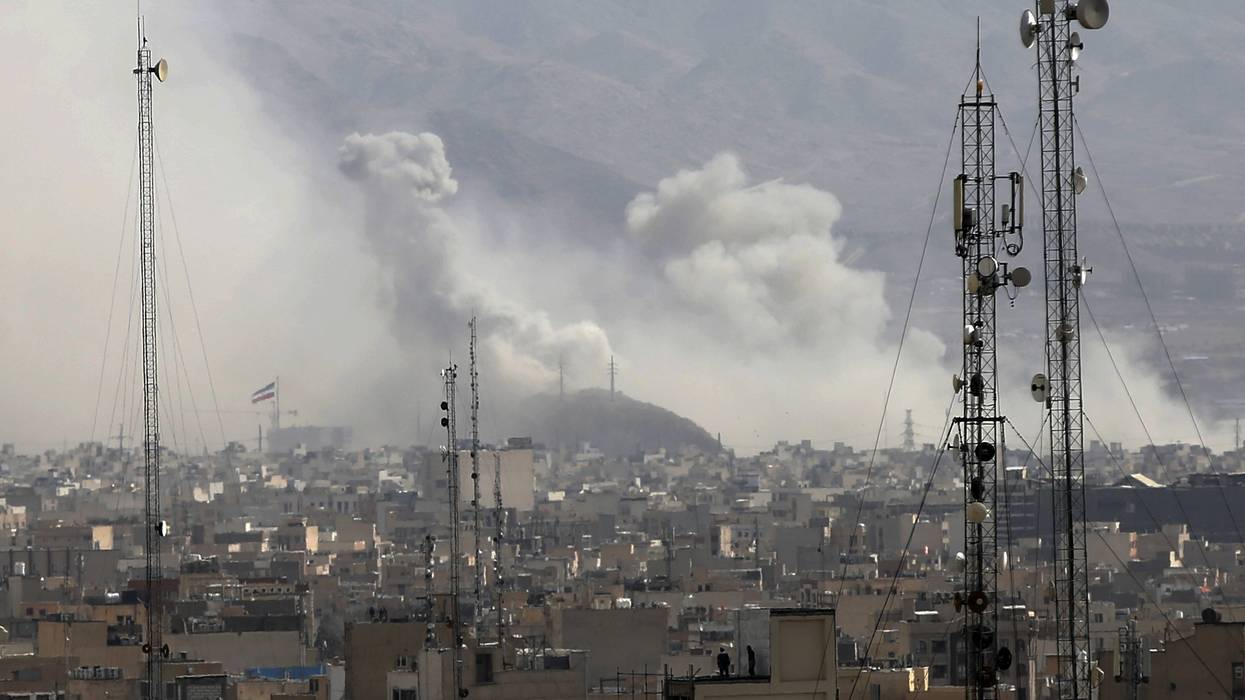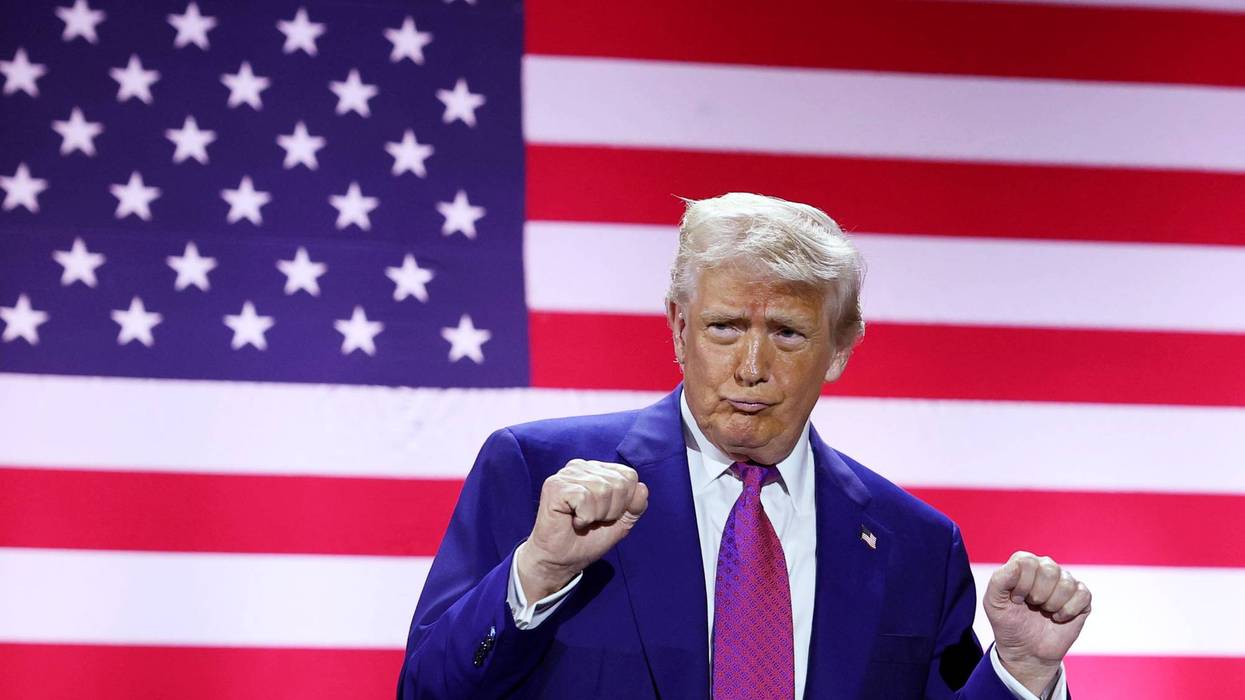LIVE COVERAGE
MIDNIGHT DEADLINE
If we fall short of our Winter Campaign goal, Common Dreams won’t have the funding needed to keep publishing in the weeks and months ahead. No corporate sponsors. No billionaires. We are funded entirely by readers, and these periodic campaigns are vital to our strength and survival.
At a moment when authoritarianism is on the rise and the corporate media is climbing into bed with fascism, nonprofit independent news outlets like Common Dreams need to be expanding our capacity, not cutting back.
Please give what you can to help meet our Winter Campaign goal by March 1. Every contribution moves the meter and helps keep independent journalism alive.
Ribbital: Democracy As Something We Do, Not Just Have
Most memorable about this week's longest, basest, game-show SOTU, a toxic, lying, us-and-them hate fest: The rowdy multitude of responses from a populace "defying the lie that we are powerless." Bigly upstaging a goalie's Medal of Freedom was "a marathon of truth-telling," from a cogent Dem response to the Portland Frogs leading a restive, joyful, shaggy defense of "this thing we call democracy" by We the People, insisting, "Don't be afraid to call it fascism - we got to meet this fuckin' moment."
The State of the Union speech, already a stale ritual of forced national unity, felt more farcical than ever in these rancorous times, a tawdry, surreal piece of performance art whose only true believers may be those MAGA morons who, when challenged, frantically, mindlessly yell "USA!! USA!!," their version of, "Oh yeah?!" They resorted to it several times Tuesday at a tacky event that over 70 deeply fed up Democrats skipped. "The President has shown no respect for the principles upon which this country is based," argued Maine's Sen. Angus King. "I cannot in good conscience participate in (a) function that would require me to ignore all that has gone before, and to pay him a measure of respect he has not earned." Other apt SOTU responses: Turner Classic Movies showed Gaslight, and Jeff Tiedrich proclaimed, "The State of the Union is - oh, who gives a fuck, really?"
The "18-year-long," "excruciatingly tedious," "most openly racist State of the Union in modern history" came as its perpetrator faces record-low 36% approval ratings, trailing by double digits in swing states and bleeding support among independents as he babbles about "fake polls," "silent support" and "made-up numbers" by "professional cheaters." His deplorable flunkies aren't faring any better. In a civil trial where investors are suing Elon Musk, his lawyers can't find jurors because so many Americans "hate him." They also hate ICE Barbie and her stormtroopers, and Kash Patel for his $75K, not-at-all-personal trip to Milan to chug beer with hockey players that so infuriated his own work force they sent 8 videos of it to media. There's also Rep. Tony Gonzales with another sex scandal MAGA doesn't need (though they need his seat), and perennial losers Kegseth and Pirro.
Still, given he "continues to live in a fantasyland where stuff becomes true just because he says it is," his SOTU was awesome, like his glittering State of Denial. Likely invisible were the Suffragette white outfits of Dem women, the photos of Renee Good and Alex Pretti, Rep. Al Green's sign, "Black People Aren't Apes" (he was escorted from the chamber), the "Release the Epstein Files" pins, and the stalwart, near-dozen Epstein survivors themselves invited by Dem lawmakers, reminders of ghastly new evidence and allegations and cover-ups lurking behind one key question from survivor Jess Michaels: “Does our government belong to the American people, or to those who prey on them?” There was, of course, no answer. In fact, there was no mention of Epstein. Or of the reviled ICE, stalled DHS, on-the-brink Iran, or long-suffering Ukraine on the 4th anniversary of its invasion.
There was, instead, a hate-lie-and-grievance-filled shit show, a Klan rally of "white-supremacist wolf whistles," a "fascist rally peppered with flop-sweat one-liners," a slurred, venomous, fact-free barrage of boasts, insults, puffery met with faithful Kim Jong Un-esque applause from co-conspirators filling up empty seats for an old man who endlessly burbled, lurched and clung to a podium as he hid a gross bruised hand behind him. It was, wrote Ana Marie Cox, a speech "simultaneously banal and unsettling (by) a greasy fleshhole of hate...rancid and powerful." Her trenchant analysis: "I fucking hate this guy." And no, full disclosure, we did not watch it. We just...couldn't. But sincere thanks to those strong souls who chronicled the debacle, most notably Mehdi Hassan and the folks of Zeteo here and here. Also to Jimmy Kimmel, for his fine, no-diapers introduction.
The musty lies and bombast unspooled. We were a dead country but now we're "the hottest." Dems are "suddenly using the word 'affordability' - somebody gave it to them," but high prices are all their fault. Countries hit by tariffs are "happy." Most foul were lurid tales about the "scourge of illegal immigration," like "Somali pirates who have ransacked Minnesota" and "pillaged $19 billion from the American taxpayer," though it was 80 Somali-Americans, led by a white American woman, who committed some fraud while over 100,000, 95% of them U.S. citizens, pay nearly $70 million in taxes and contribute $8 billion to the community but sure let's go with a collective ethnic smear. The crude, dumb, divisive finale: Stand if you agree your first duty is "to protect American citizens, not illegal aliens" - and don't forget the Seig Heil. Cheap Theatrics 'R Us.
Dems sat. Trump raged, "You should be ashamed." Ilhan Omar fought back: "You should be ashamed. You're killing Americans." MAGA yelled "USA!" Goebbels Miller shrieked “0 democrats stood for the (principle) leaders must serve citizens before invaders. Never has there been a more stunning moment in Congress." True, but not how he thinks. In a final, Oprah moment, the "merit vampire" who thrives on stolen glory bragged, "We’re winning so much we don’t know what to do about it" and to prove it here's the carefully choreographed USA Olympic hockey team who jeered with him in the locker room about their women cohorts who won bigger: "Come on in!" The MAGA frat party dregs cheered, hooted, fist-pumped more "USA!" Then he gave out medals, and fed the athletes Big Macs. Press Barbie: "He knows how to celebrate champions. No one does it like him!"
Ugh. The flip side: Kudos to the five hockey players, and the moms who likely largely raised them, who declined the non- invite; four of five came from Minnesota. And kudos to Public Enemy Hall of Fame rapper Flavor Flav, a longtime supporter of women's sports, who invited the women's team to party in Las Vegas and "celebrate for real for real" in July on a She Got Game weekend funded by him and area resorts. And gracious thanks to actor, gourmand and all-round mensch Stanley Tucci, who hosted the women on the patio of his favorite Milan restaurant, the Michelin-starred Ristorante Ratanà, where they happily feasted on pumpkin risotto and just desserts. Meanwhile, in the wake of the mad king's claptrap, Democrats won three local elections in swing states: two in Pennsylvania for a majority in the state house, one in Maine, further cementing Democrats’ hold.
Finally, there were myriad, heartening alternative events where lawmakers, advocates, Epstein survivors and whistleblowers vowed to, "Lean in, stand up and show up" in defense of democracy and fierce resistance - and stark contrast - to the small, mean narcissist down the road making up "facts" and boasting about stripping 2.4 million people of food stamps. The official Democratic response, from Virginia Gov. Abigail Spanberger, was succinct and forceful. Citing the pernicious rhetoric, cruelty, cover-ups, scams, ballrooms, she asked who benefits: "Is the president working for you? We all know the answer is no." Sen. Alex Padilla pointedly gave a follow-up in Spanish. Famously last seen getting tackled by DHS thugs for daring to ask ICE Barbie about her brownshirts' violent abuses, he asserted, "I am still here. Still standing. Still fighting."
His sense of resolve was echoed at a "People’s State of the Union” rally on the National Mall held by MoveOn and Meidas Touch, where speakers lambasted Trump's imaginary "Golden Age of America" in a country that in fact offers "one reality for everyday people and another for the rich and well-protected." Citing vast unmet needs on healthcare, housing, jobs, Pennsylvania Rep. Summer Lee of the Working Families Party vowed to "elevate the voices of (those) angry, scared and fed up with an administration that’s done nothing to help and a lot to hurt everyday people." Sen. Chris Murphy decried a speech ignoring ICE "tear-gassing schools, murdering citizens, and disappearing legal immigrants." The Progressive Caucus' Greg Casar reviled a $4-billion grifter "lecturing you, the American people, about how good you have it (when) everyone but Trump’s rich friends knows it’s a disaster,."
Meanwhile, at the National Press Club a few blocks away, a dozen members of the illustrious Portland Frog Brigade headlined a giddy, heartfelt, sold-out State of the Swamp, a SOTU "ribbital" hosted by DEFIANCE.org and advocacy media network Courier where attendees were encouraged to gather, preferably in frog caps, in "peaceful defiance and civic participation." M.C.'ed by Defiance head and former Trump staffer Miles Taylor, the event drew dozens of speakers, and a few frogs, who over several hours gave resolute, kinetic, briskly-3-minute speeches focused on the vital need to remember that, "Democracy is something we do, not just something we have." The most substantial time went to the last three speakers - the combative mayors of Minneapolis and Chicago, and an enraged Robert DeNiro - and they were all electrifying.
The mood was chill, festive, occasionally profane, but the message was consistent: In the face of unprecedented threats to our democracy by "a rapist vulgarian named Donald Trump," we must, "Refuse to shut up, sit down, or even stop ribbiting. Stay LOUD." Between speakers, video clips showed historic figures of defiance: MLK Jr, Muhammad Ali, Black Panthers, James Baldwin, John Lewis, lunch-counter sit-ins, Jesse Jackson rousing Sesame Street kids to say, "I am somebody." Next to the stage, about 20 inflatable frogs, "the jesters of this movement," stood and often danced in a "frog pond" with signs: "Damn Straight," "Amphifa," "Frogs Not Fascists." Earlier, they'd hit the Capitol to hand out pocket Constitutions to members of Congress and toured D.C. for proud green selfies. Taylor: "Who better to help navigate the swamp than a creature born in the swamp?"
Despite the focus on matters of substance - housing, healthcare, climate crisis, ICE abuses, democracy itself - the tone of many speakers was light-hearted and self-deprecating. Delaware Gov. Matt Meyers: "There are more frogs in this room than people in my state." New York Rep. Dan Goldman: "It's great to be here and not in Congress tonight." Oregon Sen. Ron Wyden on his political low profile: "I'm barely a household name in my own household." Oregon Rep. Maxine Dexter: "Thank you to the frogs who hopped across the country." The array of speakers was admirably broad - from a panel of First Amendment legal defenders to former White House Press Secretary Stephanie Grisham - and outspoken on "the weak, dumb, small, sad man" and "pathetic whiny loser who knocked down the East Wing and thinks he can knock down our democracy."
Colorado Rep. Jason Crow, one of the six veterans along with Mark Kelly under attack by Kegseth for re-iterating that the military should follow the law, began with, "Well, President Trump keeps trying to put me in prison. But I've never been very good at sitting in my foxhole and letting them send grenades my way. I fight back." Motormouth Joe Walsh, former "rock-ribbed" conservative and Illinois GOP rep with serious buyer's remorse, and author of the 2020 book Fuck Silence: Calling Trump Out for the Cultish, Moronic, Authoritarian Con Man He Is, was resolute on the "cruel bastard" who gave us Jan. 6 and "don't you for one moment think he's not gonna try" to mess with coming elections: "This moment calls for all of us to be courageous - we ain't never been here before. Our job is to blow him outta the water. Fuck Trump. The mid-terms are happening."
Over hours, their messages aligned: Fascists come after everyone in the end, even fellow fascists. MAGA is waiting its turn in the trashbin of history. Help put it there. Courage is more contagious than cowardice. An old story is dying. The elites have never been the ones to save us - it's always the people. Cruelty isn't strength, nor is defying the rule of law. Strength is the moral courage to say this is not right, to see other people as fully human. When empathy disappears, authoritarianism is next. Gutsy Minneapolis Mayor Jacob Frey: "We are not spectators in this moment. We are stewards of our democracy. Hold strong." DeNiro, on feeling "betrayed" by today's America, "like an abused spouse professing love for their abuser." "You have to lift people up," he said, his voice cracking. "If you've ever loved your country, this is the time to show it."
The aftermath of a grotesque SOTU tells us everything we need to know about the historic moment. Trump raged about "the bulging, bloodshot eyes of crazy people" who declined to stand with his fascism: "We should send them back (on) a boat with Robert DeNiro, another sick and demented person....saying (things) seriously CRIMINAL!" News surfaced that, during the speech, Ilhan Omar guest Aliya Rahman, a disabled Minneapolis woman dragged from her car by ICE who later gave searing testimony to Congress, was forcibly removed by Capitol Police and charged with "Unlawful Conduct" after she silently stood up in the gallery, like many others. On Friday, Trump held a million-dollar-a-plate, "Billionaires first, Americans last" fundraiser. And the day before, NYC Mayor Mamdani, with the help of AOC, released an adorbs video about his new free child care program. Which side are you on? Tough call.
Big Tech's 'AI Climate Hoax': Study Shows 74% of Industry's Claims Unproven
A report released on Tuesday says that the tech industry is blowing hot air with its claims that generative artificial intelligence will be beneficial for the climate.
The report, titled "The AI Climate Hoax," was commissioned by a broad consortium of environmental advocacy organizations and authored by climate and energy analyst Ketan Joshi.
In total, it analyzes more than 150 statements made by both big tech companies and organizations such as the International Energy Agency about the supposed benefits of generative AI.
The report finds that 74% of such claims made by these institutions are unproven, with 36% not bothering to cite any evidence whatsoever.
One key finding in the report is that many claims about the purported benefits of the technology conflate traditional AI systems with more recent generative AI systems, which require massive amounts of energy and are spurring demand for the construction of power-and-water-devouring data centers across the US.
"Even if these benefits are real," the report writes of traditional AI systems, "they are unrelated to—and dwarfed by—the massive expansion of energy use from the generative AI industry," which is projected to to consume 13 times as much energy as traditional AI by the year 2030.
Even the more supportable claims about the benefits of traditional AI deserve serious scrutiny, the report notes, since "they tend to rely on weaker forms of evidence, such as corporate websites, rather than published academic research," which was only cited in 26% of claims made about AI benefits.
The report also knocks big tech companies for using assorted strategies to conceal the true extent of their energy use, including buying renewable energy certificates even while relying on fossil fuels to power their operations, and vowing to implement highly implausible solutions to mitigate the climate impact of data centers, including carbon capture technologies and even building orbital data centers in space.
Commenting on the report, study author Joshi said its findings seem to show "tech companies are using vagueness about what happens within energy-hogging data centers to greenwash a planet-wrecking expansion."
"The promises of planet-saving tech remain hollow, while AI data centers breathe life into coal and gas every day," Joshi added. "These claims of climate benefit are unjustified and overhyped, and could cover up irreversible damage being done to communities and society."
Jill McArdle, international corporate campaigner at study sponsor Beyond Fossil Fuels, said the study shows "there is simply no evidence that AI will help the climate more than it will harm it," and accused Big Tech companies of "writing themselves a blank cheque to pollute on the empty promise of future salvation."
AI data centers have become a major controversy throughout the US in recent months, as their massive energy needs have pushed up utility bills and put a strain on communities’ water supplies.
A study published in the journal Nature Sustainability last year found that data centers could soon consume as much water as 10 million Americans and emit as much carbon dioxide as 10 million cars, or roughly the same amount of consumption as the entire state of New York.
As Trump Imposes New Tariffs, State Lawmakers Demand Direct Refunds for Americans
As President Donald Trump plows ahead with his controversial and legally contested tariffs, he faces mounting pressure to refund Americans for duties struck down last week by the US Supreme Court, including in a letter from 21 Democratic state legislators, first reported Tuesday by Common Dreams.
Lawmakers from Colorado, Illinois, Iowa, Maine, Michigan, New Hampshire, New York, Pennsylvania, Tennessee, Texas, and Vermont called for a swift response to the high court's "definitive ruling" last Friday that the president's imposition of tariffs under the International Emergency Economic Powers Act (IEEPA) "is illegal, unconstitutional, and amounts to an unauthorized tax on the American people."
"Your illegal tariff taxes have created an unprecedented affordability crisis, spiking prices for groceries, cars, clothes, electronics, and countless other household necessities," the lawmakers noted. "Families across our states have been forced to make impossible choices between paying for food, keeping the heat on, and affording clothing for their children."
"Farmers have lost markets, small businesses have been stretched to the breaking point, manufacturing hasn't returned as you promised, job growth flatlined, layoffs rose, and the economy has slowed to a crawl," they continued. "Your illegal tariffs have been an unmitigated disaster."
The legislators demanded that Trump "work with Congress immediately to provide a refund to American families for the illegal tariff taxes you imposed on them through higher prices on everything, from clothes and cars to electronics and groceries, and which cost families at least $1,700 each last year alone."
"These refunds should go to the American people, not just the businesses who paid the tariffs and passed on their cost to Americans in the form of higher prices, lost wages, and layoffs," they stressed. The lawmakers also demanded that Trump "immediately abide by the court's ruling and stop collecting these illegal tariff taxes," and "cease and desist on any plan or scheme to reimpose the tariffs at issue in the Supreme Court's decision without congressional approval."
The letter was organized by Defend America Action as part of a campaign pushing for tariff refunds and also sent to US Senate Majority Leader John Thune (R-SD) and House Speaker Mike Johnson (R-La.). Its signatories include Colorado Sen. Cathy Kipp (D-14) as well as Illinois Sens. Mary Edly-Allen (D-31) and Graciela Guzmán (D-20).
The other signatories are Democratic Reps. Ken Croken (97) of Iowa; Gary Friedmann (14) of Maine; Noah Arbit (20) and Stephen Wooden (81) of Michigan; Susan Almy (Grafton 17), Tony Caplan (Merrimack 8), and Linda Haskins (Rockingham 11) of New Hampshire; Jo Anne Simon (52) of New York; Arvind Venkat (30) of Pennsylvania; Aftyn Behn (51) Tennessee; Rhetta Andrews Bowers (113), Jessica González (104), Vikki Goodwin (47), Josey Garcia (124), Vincent Perez (77), Ron Reynolds (27), and Gene Wu (137) of Texas; and Will Greer (Bennington 2) of Vermont.
Trump is also facing pressure from Democratic governors and members of Congress in the wake of the high court's ruling. On Monday, US Sens. Ed Markey (D-Mass.), Jeanne Shaheen (D-NH), and Ron Wyden (D-Ore.)—along with 19 other members of the chamber's Democratic Caucus, including Senate Minority Leader Chuck Schumer (D-NY)—unveiled the Tariff Refund Act.
The bill would require US Customs and Border Protection to pay refunds for the $175 billion in unlawfully imposed tariffs within 180 days, prioritizing small businesses. It calls on importers, wholesalers, and large corporations to pass on those refunds to their customers.
On Tuesday, US Sens. Cory Booker (D-NJ), Elizabeth Warren (D-Mass.), and Peter Welch (D-Vt.)—who are all notably not original co-sponsors of that bill—wrote to Trump and highlighted that roughly 95% of the cost from Trump's IEEPA tariffs "was passed on to American families and small businesses in the form of increased costs."
"Any refunds from the federal government should be returned to the millions of Americans and small businesses that were illegally cheated out of their hard-earned money," the trio argued. "Your inability or unwillingness to provide tariff refunds to American families would represent an egregious abdication of your responsibility as president—a giveaway to giant corporations that amounts to theft from the middle class."
In the House of Representatives, Congressional Progressive Caucus Chair Greg Casar (D-Texas) also signaled support for refunds, taking aim at Trump on social media Tuesday morning: "We need our money back. He owes us: $1,700 in illegal tariffs per family; $4 billion he's profited off the presidency; $1 trillion he stole in tax breaks for the ultrarich."
Trump has responded to the Supreme Court's decision by not only lashing out at justices but also doubling down on his mission to impose tariffs. Rather than relying on the IEEPA, Trump is now invoking Section 122 of the Trade Act of 1974. A 10% tariff took effect on Tuesday, though the president promised over the weekend that he would aim for 15%.
"Every day, I hear from my neighbors how their cost of living is rising rapidly," Venkat, one of the state lawmakers who signed the letter, told Common Dreams. "Whether it's food, utilities, housing, or healthcare, tariffs are driving inflation and a regressive tax."
Venkat said that Trump doubling down on tariffs is "disastrous for my constituents and all Pennsylvanians."
'Batshit Authoritarianism': Trump Allies Drafting Order to Give Him 'Extraordinary Power Over Voting'
A group of right-wing activists is crafting an executive order that would let President Donald Trump unilaterally ban mail-in ballots and voting machines ahead of the 2026 midterm elections.
The Washington Post reported on Thursday that the order being drafted by Trump allies would give him "extraordinary power over voting," even though the US Constitution explicitly gives individual states the powers to run their own elections.
An advocate for the order, Florida attorney Peter Ticktin, acknowledged in an interview with the Post that the Constitution does not give the president any role in shaping elections, but he said Trump needed to act to prevent China from supposedly interfering with American elections.
"Under the Constitution, it’s the legislatures and states that really control how a state conducts its elections, and the president doesn’t have any power to do that,” Ticktin said. "But here we have a situation where the president is aware that there are foreign interests that are interfering in our election processes. That causes a national emergency where the president has to be able to deal with it."
The activists drafting the emergency order said that they are working in coordination with the White House, although the extent of any cooperation isn't clear.
However, the Post pointed to some evidence that the White House really is on board with such a strategy, such as the Trump administration's efforts to investigate his 2020 election loss to former President Joe Biden, which the president has long baselessly claimed was due to foreign interference from a number of nations, including China and Venezuela.
As the Post noted, "a 2021 intelligence review concluded that China considered efforts to influence the election but did not go through with them."
Additionally, Trump has publicly stated numerous times that he wants to completely do away with mail-in ballots and voting machines, both of which he has baselessly claimed are riddled with fraud.
Sen. Mark Warner (D-Va.), the ranking member of the Senate Intelligence Committee, said that the draft order was simply an attempt by the president's allies to block democratic accountability in future elections.
"We've been raising the alarm for weeks about President Trump’s attacks on our elections and now we’re seeing reports that outline how they may be planning to do it,” Warner told the Post. “This is a plot to interfere with the will of voters and undermine both the rule of law and public confidence in our elections."
Government watchdog Citizens for Responsibility and Ethics in Washington (CREW) said that the drafted order was plainly unconstitutional and would fail in court.
"The Constitution gives states power over election law with oversight from Congress," CREW wrote in a social media post. "Notice who's missing? The president. Trump may try to cook up a sham national emergency to try to seize control of elections but it won't stand up to scrutiny."
MS NOW national security contributor Marc Polymeropoulos called the draft order "batshit authoritarianism" and cautioned that "this crazy shit is possible as Trump knows Congress is all but lost at this point in a free election."
"To save himself," Polymeropoulos added, "anything is possible."
Democratic Illinois Gov. JB Pritzker pointed to the Post report and warned, "Donald Trump’s plan to steal the 2026 midterm elections is already underway."
Rep. Rosa De Lauro (D-Conn.) accused Trump of "setting the stage to steal the midterm elections and set fire to our democracy," while vowing that Democrats would "fight for our democracy and safeguard the right to vote."
'A Global Failure': UN Says 7,667 People Died or Went Missing on Migration Routes in 2025
A United Nations organization announced Thursday that at least 7,667 people died or went missing on migration routes worldwide last year—or around 21 migrants per day—but "the real toll is likely higher."
"Sea crossings remained among the deadliest routes," according to the International Organization for Migration. IOM found that at least 2,185 people died or went missing in the Mediterranean Sea, and another 1,214 on the Western Africa/Atlantic route toward the Canary Islands.
Nearly two months into a new year, the trend in the Mediterranean has persisted. IOM pointed to the "unprecedented number of migrant deaths in the first two months of 2026, with 606 recorded" as of Tuesday.
"The continued loss of life on migration routes is a global failure we cannot accept as normal," said IOM Director General Amy Pope in a statement. "These deaths are not inevitable. When safe pathways are out of reach, people are forced into dangerous journeys and into the hands of smugglers and traffickers."
"We must act now to expand safe and regular routes, and ensure people in need can be reached and protected, regardless of their status," Pope asserted.
Despite such calls, the European Union has worked to curb migration to the continent with its Pact on Migration and Asylum—which has been condemned as a "bow to right-wing extremists and fascists," and is set to take effect next June—and the related "return regulation" that the Council of the EU finalized in December.
"The EU is legitimizing offshore prisons, racial profiling, and child detention in ways we have never seen," Sarah Chander, director at the Equinox Initiative for Racial Justice, said of the council's move last year. "Instead of finding ways to ensure safety and protection for everybody, the EU is pushing a punishment regime for migrants, which will help no one."
Reporting on the new IOM data, Politico noted Thursday:
The EU's priority now is "about bringing illegal arrivals to a minimum and keeping those numbers there," Migration Commissioner Magnus Brunner said when presenting the bloc's migration strategy in January.
That's "not as an end in itself," he said, but reduces pressure on EU countries, prevents abuse, reinforces people's trust in the EU, and helps save lives. "Any smuggling trip prevented is potentially a life which we save."
As a next step, the EU "must address migration along the whole route," including by ensuring protection for people in need "closer to the point of departure," Brunner said.
Meanwhile, in the Americas, US President Trump returned to power in early 2025, having campaigned on a promise of mass deportations. He's aimed to deliver on the pledge by deploying federal agents to various cities, where they have terrorized immigrants and citizens alike with civil rights violations and, in some cases, fatal shootings.
IOM only recorded 409 deaths in the Americas last year, the lowest annual total since its data collection began in 2014. The organization said that "this is likely due to fewer people taking dangerous irregular pathways, such as crossing the Darien Jungle or the US-Mexico border. However, lags in reporting from officials means that the figures for 2025 in the Americas likely will not be finalized until mid-2026."
The overall figure is also down, from nearly 9,200 in 2024. However, IOM explained that "the decline reflects fewer people attempting dangerous irregular migration routes, particularly in the Americas, but is also due to restricted access to information and funding constraints for humanitarian actors documenting migrant deaths on key routes."
IOM called for "urgent funding to strengthen data collection to better guide the humanitarian system in delivering lifesaving responses."
Reuters highlighted that "the Geneva‑based organization is among several aid groups hit by major US funding cuts, forcing it to scale back or close programs in ways it says will severely impact migrants."
'Bombs Will Be Dropping Everywhere': Trump Launches Illegal Regime Change War Against Iran
President Donald Trump announced in the early hours of Saturday morning that the US has launched a massive military operation aimed at toppling the Iranian government as blasts were reported in Tehran, including near the offices of Supreme Leader Ayatollah Ali Khamenei.
Israel, under the leadership of Prime Minister Benjamin Netanyahu, is taking part in the assault. Unnamed Israeli security sources told Channel 12 that Israel and the Trump administration are "going all in" against Iran as Trump instructed Iranians to "stay sheltered," warning that "bombs will be dropping everywhere." People were seen seeking cover in Tehran as the US and Israeli bombs began to fall.
The assault, dubbed "Operation Epic Fury" by the Pentagon, comes days after the US and Iran took part in talks in Geneva, which Trump's envoys characterized as "positive." In announcing military action on Saturday, Trump said falsely that the Iranian government has "rejected every opportunity to renounce their nuclear ambitions."
The US and Israeli attacks—which both nations characterized as "preemptive"—are plainly illegal under international law, which prohibits the threat or use of force except in response to an armed attack. The Trump administration is also violating US law, which gives Congress the sole power to declare war.
"The term 'preemptive' is pure propaganda," wrote Drop Site journalist Jeremy Scahill. "The US once again used the veneer of negotiations as a cover to bomb Iran. Tehran had just offered terms that went far beyond the 2015 nuclear deal. What was preempted was diplomacy. The same propaganda tactics used in the 2003 Iraq war."
Trump, who ditched the 2015 nuclear deal during his first White House term, repeatedly made clear in his remarks Saturday that he does not intend the new assault on Iran to be limited in scope like his bombings of Iranian nuclear sites last year. In the weeks leading up to Saturday's attack, the Trump administration carried out a massive military buildup in the Middle East even as the president publicly claimed he was open to a diplomatic resolution.
"We may have casualties," the US president said of American troops. "That often happens in war. But we're doing this not for now. We're doing this for the future."
Trump also urged the Iranian armed forces to surrender or "face certain death" as the US fired Tomahawk cruise missiles and other munitions at Iran.
The Iranian government's immediate response to Saturday's onslaught was a pledge of "crushing retaliation" and a wave of drone and missile attacks on Israel. The Associated Press reported that "hours after the strikes on Iran, explosions rocked northern Israel as the country worked to intercept incoming Iranian missiles."
Iran's foreign minister later informed his Iraqi counterpart that Iran would be targeting US military installations in the region in retaliation for Saturday's attacks.
A spokesperson for the Iranian military declared that "we will teach Israel and America a lesson they have never experienced in their history."
"Any base that helps America and Israel will be the target of the Iranian armed forces," the official added.
'The Behavior of Rogue States': Global Revulsion as US and Israel Launch War on Iran
"The attacks on Iran by Israel and the United States are illegal, unprovoked, and unjustifiable," said Jeremy Corbyn, an independent member of the UK Parliament.
Elected officials, activists, and experts around the world voiced horror and outrage Saturday as US President Donald Trump and Israeli Prime Minister Benjamin Netanyahu jointly launched an illegal war on Iran with the explicit goal of toppling the nation's government, sparking chaos throughout the Middle East.
The wave of bombings, expected to mark the beginning of a wider assault, spurred airspace closures and flight cancellations across the region as countries braced for the fallout. While European leaders offered milquetoast responses to the unlawful military attack and Canadian and Australian officials openly endorsed it, leftist politicians and others unequivocally condemned the US and Israel as the aggressors.
"The attacks on Iran by Israel and the United States are illegal, unprovoked, and unjustifiable," said Jeremy Corbyn, an independent member of the British Parliament and former leader of the UK Labour Party. "Peace and diplomacy was possible. Instead, Israel and the United States chose war."
"This is the behavior of rogue states—and they have jeopardized the safety of humankind around the world with this catastrophic act of aggression," Corbyn added. "Our government must condemn this flagrant breach of international law, and urgently pursue a foreign policy based on justice, sovereignty, and peace."
Progressive International co-founder Yanis Varoufakis, the former finance minister of Greece, echoed Corbyn's criticism of the US and Israel as "rogue states."
"Israel and the USA," he wrote on social media, "have started a war not against Iran but against the whole world. We stand with Iranians, with humanity, against the notion that Israel and the US can bomb anyone their fancy takes them to bomb."
Badr Albusaidi, the foreign minister of Oman and the mediator of recent US-Iran talks, said he was "dismayed" by news of the US-Israel attacks on Iran, which were quickly followed by reports of horrific atrocities. Albusaidi said hours before the bombs started falling on Iran that a diplomatic resolution was within reach.
"Active and serious negotiations have yet again been undermined," Albusaidi lamented on Saturday. "Neither the interests of the United States nor the cause of global peace are well served by this. And I pray for the innocents who will suffer. I urge the United States not to get sucked in further."
Leftist Colombian President Gustavo Petro said he believes "President Donald Trump has made a mistake today" and implored the "helpless United Nations" to "convene immediately" in response to the US-Israel attacks and retaliation by Iran and allied groups in the region.
Iran vowed a "crushing" response to the US-Israeli onslaught, firing drones and missiles at Israel and pledging to hit US military installations in the region.
Al Jazeera reported that "Iran has targeted United States assets across the Gulf Arab states in retaliation for a huge joint attack on Iran by the US and Israel, as the region’s worst fears of being ignited in the flames of a sustained war loom."
"The Iranian government on Saturday confirmed its attacks on several targets, according to the Fars news agency, including Bahrain, Kuwait, Qatar, and the United Arab Emirates, where US airbases are hosted," the outlet noted.
Iran Demands Emergency United Nations Action Amid 'Criminal Aggression' by US, Israel
"Just as we were ready for negotiations, we are more ready than ever for defense," said the Iranian Foreign Ministry.
Update:
The United Nations Security Council is set to hold an emergency meeting at 4:00 pm ET on Saturday to discuss the US-Israeli attacks against Iran.
Earlier:
As US and Israeli bombs fell on Tehran, the Iranian Foreign Ministry on Saturday vowed that the country would defend itself against "criminal aggression" and implored the United Nations Security Council to take emergency action.
The ministry said in a lengthy statement that Saturday's attacks, which US President Donald Trump characterized as the start of a massive military operation aimed at overthrowing the Iranian government, represent "a violation of Article 2, Paragraph 4, of the United Nations Charter and a clear armed aggression against the Islamic Republic of Iran."
"The Islamic Republic of Iran notes the grave duty of the United Nations and its Security Council to take immediate action to confront the violation of international peace and security," reads the ministry's statement, which noted that the US and Israeli assault began "in the midst of a diplomatic process."
"The Iranian people are now proud that they did everything they could to prevent war," the statement continues. "Now is the time to defend the homeland and confront the enemy's military aggression. Just as we were ready for negotiations, we are more ready than ever for defense. The armed forces of the Islamic Republic of Iran will respond to the aggressors with authority."
Ben Saul, the UN special rapporteur on human rights and counterterrorism, condemned US-Israeli "aggression against Iran" in a social media post, calling the assault a "violation of the most fundamental rule of international law—the ban on the use of force."
"All responsible governments should condemn this lawlessness from two countries who excel in shredding the international order," Saul added.
Trump Says He's 'Entitled' to Illegal Third Term as Allies Draft Voter Suppression Decree
Extensions of presidential terms or abolition of limits are hallmarks of dictators and backsliding leaders of erstwhile democracies.
President Donald Trump raised eyebrows and angst among democracy defenders Friday for saying he deserves an unconstitutional third term in office, remarks that came a day after reporting that right-wing activists are drafting an executive order that could empower him to ban mail-in ballots and voting machines ahead of the 2026 midterm elections.
"Maybe we do one more term. Should we do one more?" the 79-year-old Republican president asked attendees of an event at the Port of Corpus Christi in Texas, to roaring applause. "Do one more term. Well, we are entitled to it."
During his State of the Union address on Tuesday, Trump rehashed his thoroughly debunked claim that Democrats stole the 2020 election for former President Joe Biden, saying this "should be my third term."
A third term would require a constitutional amendment, as the 22nd Amendment restricts US presidents to two terms in office.
Trump: Maybe we do one more term. Should we do one more? One more term. Well, we are entitled to it. pic.twitter.com/Niue0Q75Oo
— Acyn (@Acyn) February 27, 2026
Extensions of presidential terms or abolition of limits are hallmarks of dictators and backsliding leaders of erstwhile democracies. After Chinese President Xi Jinping lifted constitutional term limits in 2018, Trump marveled, "He's great," adding, "He's now president for life."
Trump has made cryptic allusions to a third term in office on multiple occasions.
While many Trump supporters believe he should also be president for life, his allies in actual positions of power—including Sen. Lindsey Graham (R-SC) and political strategist and convicted fraudster Steve Bannon, whom Trump granted clemency—have backed a third term for his administration.
A constitutional amendment enabling a third Trump term is not under any consideration and is all but impossible by the 2028 election. So Trump and his allies are working on other ways for the president to remain in office, focusing heavily on voter suppression. The Washington Post reported Thursday that a group of right-wing activists is writing a draft decree that would give the president “extraordinary power over voting." On Friday, Democracy Docket published an April 2025 version of the draft order provided by a Trump ally, which the outlet described as "riddled with errors."
According to the Post, the draft executive order would cite the pretext of alleged Chinese interference in the 2020 election. The Office of the Director of National Intelligence concluded that there was no such interference.
MS NOW national security contributor Marc Polymeropoulos called the draft order “batshit authoritarianism."


